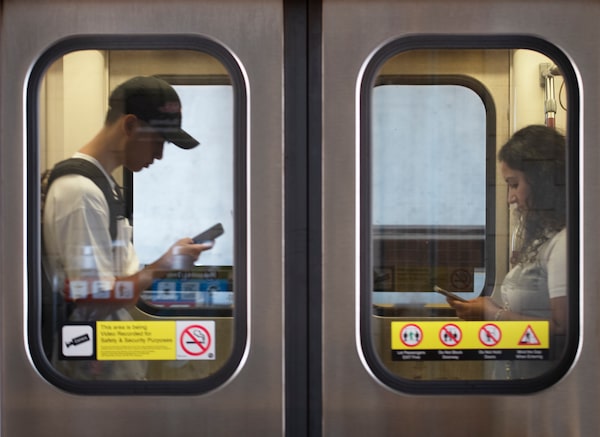
TTC passengers using their mobile phones while heading south on the Yonge subway line on Aug. 21.Fred Lum/The Globe and Mail
Rogers Communications Inc. RCI-B-T is accusing Telus Corp. T-T of being “hypocritical” in a new regulatory filing as the dispute between the telecoms over access to the Rogers-owned wireless network inside the Toronto subway system continues to drag on.
The conflict between Rogers and its two chief rivals – Telus and BCE Inc. BCE-T – began several months ago, after Rogers acquired BAI Canada Inc., the Canadian branch of an Australian telecommunications infrastructure company with the sole right to develop wireless infrastructure inside Toronto Transit Commission subway tunnels.
Although Rogers has vowed to work with the other carriers to grant them access to the network, the companies appear to be deadlocked, with each side accusing the other of refusing to negotiate.
Toronto-based Rogers launched 5G service on the busiest portions of the subway last week amid consultations by federal Industry Minister François-Philippe Champagne, as well as a continuing review by Canada’s telecom regulator, the CRTC.
In June, BCE asked the Canadian Radio-television and Telecommunications Commission for an order prohibiting Rogers from bringing its own customers onto the network until it is able to provide access to all wireless carriers.
Federal government to intervene in Toronto subway wireless spat
Telus subsequently filed a submission in support of Bell’s application, arguing that Rogers has granted itself what’s known as an undue preference because it has been unwilling to negotiate Telus’s access to the network on a timely basis. Canada’s Telecommunications Act prohibits carriers from giving themselves or others what it deems an unreasonable advantage, or undue preference.
Rogers responded to the Vancouver-based telecom’s allegation in a filing to the CRTC late last week.
“Telus’ arguments are hypocritical,” the submission reads. “There is a long history of Rogers and other carriers facing significant stone-walling by Telus in obtaining access to its infrastructure.”
Rogers alleges that it has been trying for two years to get access to poles owned by Telus so that it can attach its own cellular equipment onto them.
“Telus cannot credibly claim in light of these facts that negotiations with Rogers to access the TTC [network] – infrastructure that Rogers only acquired in April of this year and that has required detailed technical assessment by Rogers since closing to determine its capabilities – have not been timely and regulatory intervention is required to remediate an undue preference,” the company argues.
Richard Gilhooley, a spokesman for Telus, said in a statement that the allegations are “just another example of Rogers acting in bad faith and attempting to mislead the regulator and the government as they continue to flaunt the rules and deny service to significant portions of the TTC ridership.”
The issue of cellphone service on the TTC gained prominence after a string of violent attacks on the transit system, which sparked calls for the telecoms to offer service inside the subway tunnels as a safety measure.
Last week, Mr. Champagne said he would take “decisive action” to ensure that all carriers are able to offer service inside the subway system.
Mr. Champagne’s department issues licences for spectrum, the airwaves used to transmit wireless services. Innovation, Science and Economic Development Canada (ISED) launched a consultation in July with a view to potentially imposing additional conditions on those licences.
One of the options that ISED was considering was a condition that would have prohibited Rogers from launching service before coming to terms with BCE and Telus. Rogers, which went ahead with its launch before the consultation process had concluded, has objected to such a condition.
Rogers spokesman Cam Gordon said in a statement last week that the company will continue to “respectfully participate” in the consultation process. The carriers have until Monday to submit their replies.